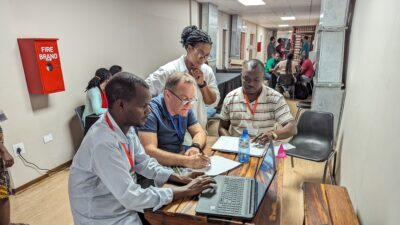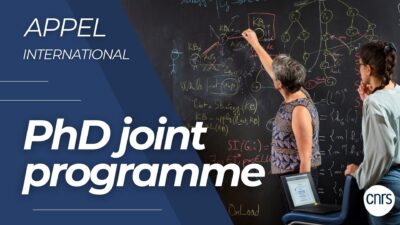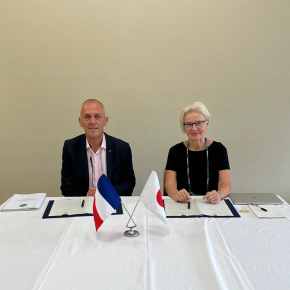
On November 15, during the meeting between JINR director Grigory Trubnikov and CNRS CEO Antoine Petit, a specific agreement was signed as part of the February 2018 cooperation agreement between the two institutions.
This agreement strengthens the collaboration in theoretical and mathematical physics, mathematical modeling and information technologies between JINR and the Poncelet Interdisciplinary Scientific Center (ISCP), the CNRS international research laboratory (IRL) established in partnership with Skoltech, the École supérieure of Economics, the Independent University of Moscow and the Institute of Information Transmission Problems of the Russian Academy of Sciences.
A lire aussi
CNRS-Africa cooperation: eight new Joint Research Programmes launched

Dans le cadre de son Plan pluriannuel de collaborations avec l’Afrique lancé en 2022, le CNRS poursuit son engagement avec le continent africain en soutenant des projets co-construits visant à renforcer les coopérations scientifiques. Après une première vague de financement en 2023, un second volet a permis de sélectionner huit nouveaux projets innovants couvrant un large éventail de disciplines, alliant excellence scientifique, partage d’intérêts communs et équité, co-portés avec des institutions de 8 pays africains.
PhD joint programmes - édition 2024

Le CNRS initie des dialogues bilatéraux avec les grands acteurs de la recherche mondiale autour de « PhD Joint Programmes ». Chaque projet conjoint sélectionné permettra le financement d’une bourse doctorale sur 3 ans, et de mobilité entre la France et le pays partenaire. Retrouvez les appels ouverts en 2025 // The CNRS initiates bilateral dialogues with major players in world research through "PhD Joint Programmes". Each selected joint project will provide funding for a 3-year PhD scholarship, and mobility between France and the partner country. Find out more about the calls open in 2025
Le CNRS ouvre un laboratoire international au Japon dédié à la biodiversité des récifs coralliens

Le CNRS et l’Okinawa Institute of Science and Technology (OIST) ont signé, le 7 octobre 2024 à Kyoto, un MoU pour la création de l’IRL EARLY . Ce nouveau laboratoire international se concentrera sur l’étude du cycle de vie des poissons coralliens dans le contexte de la préservation des récifs, sous les pressions anthropiques croissantes.










